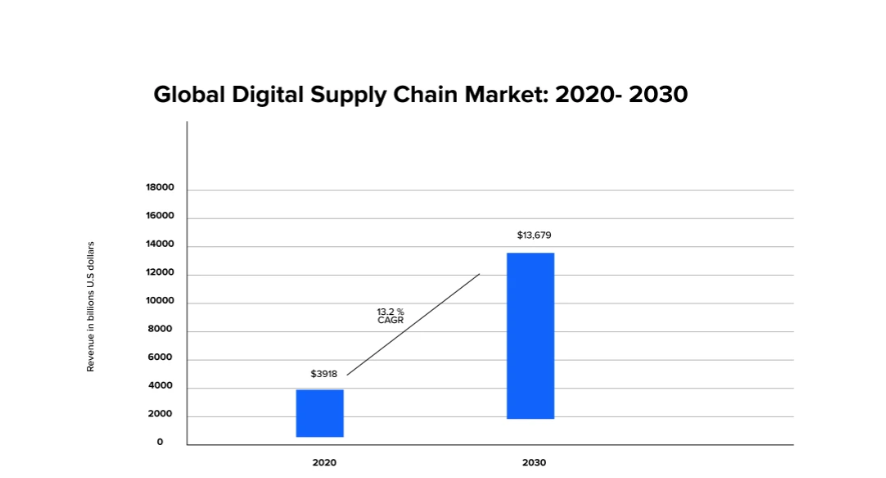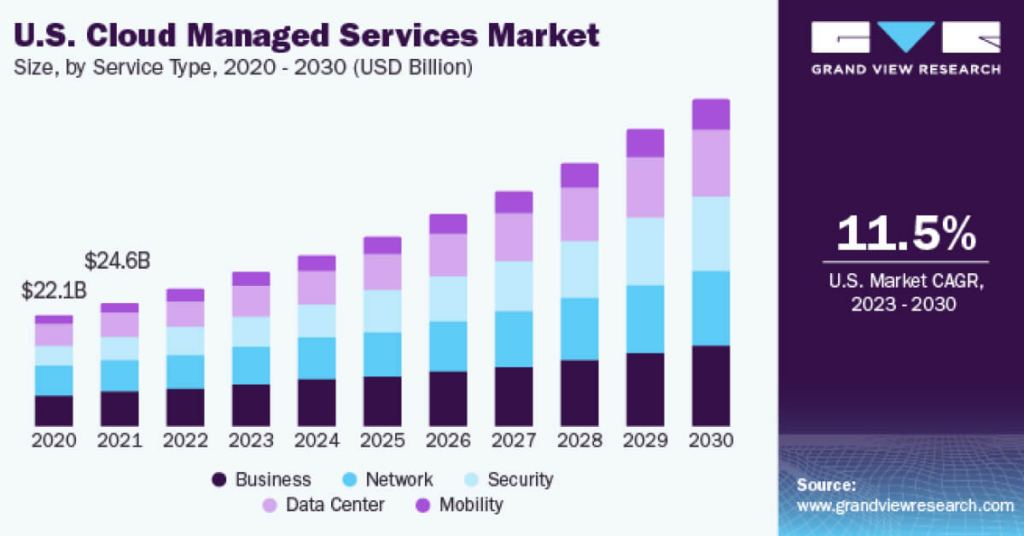Accelerate IT operations with AI-driven Automation
Automation in IT operations enable agility, resilience, and operational excellence, paving the way for organizations to adapt swiftly to changing environments, deliver superior services, and achieve sustainable success in today's dynamic digital landscape.
Driving Innovation with Next-gen Application Management
Next-generation application management fueled by AIOps is revolutionizing how organizations monitor performance, modernize applications, and manage the entire application lifecycle.
AI-powered Analytics: Transforming Data into Actionable Insights
AIOps and analytics foster a culture of continuous improvement by providing organizations with actionable intelligence to optimize workflows, enhance service quality, and align IT operations with business goals.
The supply chain industry is undergoing a transformative shift driven by agility, the need for greater efficiency, and responsiveness in an increasingly complex global environment. With the exponential growth of data, the need for real-time insights, and heightened customer expectations, traditional supply chain practices are proving inadequate.
As consumer expectations soars high, the demand for transparency and speed in supply chain operations is also increasing. Moreover, traditional way of just monitoring supplies and customers is no longer enough to cater to the evolving needs. This is where the need for digital solutions that can meet these demands by providing customers with real-time tracking and accurate information becomes significant, as it helps enhance trust and loyalty.
According to the Allied Market Research report, the global digital supply chain market is set to reach $13,679 million by 2030, experiencing a CAGR of 13.2%. With technological advancements, improving operational efficiency and agility, and an increased focus on sustainability and risk management becoming more important than ever, the shift towards digital transformation in supply chain management has been prominent.
Cloud managed services not only simplify IT management but also enable businesses to achieve operational excellence by enhancing efficiency, cutting costs, and fostering business agility. By outsourcing the management of cloud infrastructure, companies can focus on innovation and growth without being burdened by technical complexities. With the global cloud managed services market expected to grow at a compound annual growth rate (CAGR) of 14.7% through 2030, it’s clear that more and more businesses are realizing the value of this transformative approach.
Source: Grand View Research
But what exactly makes cloud managed services so vital for today’s businesses, and how can they unlock new avenues for growth?
The Need for Digital Transformation in Supply Chain
Digital technologies like the Internet of Things (IoT), Machine Learning (ML), Artificial Intelligence (AI), and advanced analytics are revolutionizing supply chain management by providing end-to-end visibility, automating processes, and enhancing decision-making capabilities. These innovations enable companies to streamline operations, reduce costs, and improve accuracy, ultimately leading to better customer satisfaction and competitive advantage.
Here’s why organizations need supply chain digital transformation:
Why Do Businesses Need Cloud Managed Services?
Key Metrics for Effective Automated Regression Testing
The increasing reliance on cloud-based solutions, coupled with the growing complexity of IT infrastructure, has led to an overwhelming demand for cloud managed services. Here are some compelling reasons why businesses need these services today:
Take an in-depth look at how Shift Left Testing can enhance your QA with Open Data Core (ODC) Meta connector and Qyrus. Read Now
1. Increased Customer Expectations
Today shopping convenience is key, as customers desire transactions and quick product deliveries while also seeking transparency, in how goods move through the supply chain process. This is where supply chain digital transformation matters, as it helps companies enhance customer satisfaction through real-time updates.
2. Globalization and Complexity
As companies enter new markets and broaden their reach of operations, supply chain management becomes more intricate and harder to handle. Moreover, juggling between suppliers, logistics collaborators and compliance standards often proves challenging for systems. In such scenarios, adopting transformation strategies aids in simplifying these operations, resulting in improved efficiency and streamlined processes.
3. Data-Driven Decision Making
In a world flooded with information, businesses must use data analysis to extract insights for efficient data-driven decision-making. And to analyze these extensive data sets, digital technologies play vital role by extracting real-time insights from vast amount of data that can be used by supply chain leaders to optimize inventory levels, forecast demand, and enhance overall efficiency.
Tailor KPIs to Your Use Case:
For example, a financial services app might prioritize low response times for transaction processing, while an e-commerce platform might focus on throughput during high traffic sales events. Customize your performance KPIs based on your specific application and business needs.
Qyrus, for instance, offers real-time tracking of these KPIs, enabling teams to monitor them during test execution and view historical performance trends. This continuous feedback loop allows Agile teams to tweak their systems to ensure they meet business goals.
4. Competitive Advantage
With many companies already embracing digital technologies, staying ahead requires businesses to implement digital solutions that can respond to market changes swiftly, optimize operations, and ultimately outperform competitors.
Challenges in the Digital Transformation Journey
Despite the many benefits, the journey toward supply chain digital transformation is fraught with challenges:
- Data Integration and Management: The major challenge in supply chain management remains data integration from various sources across the funnel. Moreover, with many organizations operating with siloed systems seamless flow of information often hinders transformation journeys.
- Resistance to Change and Skill Gaps: Implementing new technologies often meets with resistance especially from employees who are accustomed to traditional methods. As embracing, anything new requires the need for specialized skills to manage and leverage advanced technologies lack of which becomes a significant barrier to successful digital transformation.
- Cybersecurity Risks: As supply chains become more interconnected and dependant on digital technologies, they become more vulnerable to cyber attacks. Hence, ensuring the security of sensitive data and protecting against cyber threats is a critical concern, which often restricts supply chain leaders from digitalization of their operations.
- High Initial Costs and Complexity: The initial investment required and the complexity of integrating new technologies with existing systems for digital transformation can be daunting, particularly for smaller organizations.
Did you know? According to a report by Forrester, companies using cloud-based testing environments have reduced their testing costs by up to 45% while improving test coverage by 30%.
Benefits of Digital Transformation in Supply Chain
Despite these challenges, the benefits of embracing digital transformation in supply chains far outweigh the obstacles:
1. Enhanced Visibility and Transparency
Digital platforms provide real-time insights into the supply chain, enabling organizations to monitor inventory levels, track shipments, and predict potential disruptions, fostering transparency and trust among stakeholders and allowing proactive decision-making.
2. Improved Efficiency and Reduced Costs
Automation of repetitive tasks, streamlined processes, and optimized resource allocation lead to increased efficiency and reduced operational costs. Digital tools can enhance supply chain collaboration, minimizing delays and waste.
3. Better Demand Forecasting
With advanced analytics, companies can analyze market trends, customer behavior, and seasonal fluctuations to improve demand forecasting. Accurate forecasts enable better inventory management and reduce the risk of stockouts or overstock situations.
4. Agility and Responsiveness
In a rapidly changing market, for any organization agility is key. And in this journey to ensure business agility, digital transformation plays important role as it enables organizations to adapt quickly to new market updates, customer preferences, and supply chain disruptions, ensuring they remain competitive.
5. Enhanced Customer Experience
By leveraging digital tools, companies can provide customers with real-time updates on their orders, manage returns efficiently, and offer personalized experiences, leading to higher customer satisfaction and loyalty.
6. Sustainability
Conclusion
As customer expectations rise and market complexities increase, organizations must embrace emerging technologies to remain competitive. While challenges exist, the benefits—ranging from enhanced visibility and efficiency to improved customer experiences—make the effort worthwhile.
For companies willing to invest in digital transformation, the path forward is clear. By overcoming resistance, integrating modern solutions, and prioritizing data security, businesses can position themselves for success in an increasingly digital world.
In the end, the journey toward digital transformation is not just about investing in technology; it’s about rethinking how supply chains operate to deliver maximum value in a rapidly evolving marketplace.






